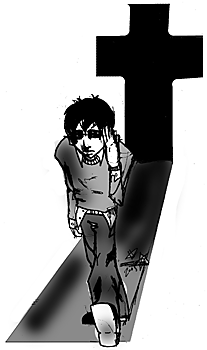 |
|
Damion LeeNatali
Columnist
|
|
|
By Damion LeeNatali
Arizona Daily Wildcat
Friday, February 4, 2005
Print this
Peter is an imposing figure. On this sunny Arizona afternoon, his sleeves are rolled up and small streams of sweat disappear behind his mirrored sunglasses. Gesticulating with one hand and clutching a Bible in the other, he speaks in insistent tones, the coiled muscles in his jaw clenching and relaxing with the cadence of his speech. Even in the heat, Peter doesn't pause for water (Peter isn't his real name, which he declined to give).
"This university is spreading lies!" he exclaims from Alumni Plaza, snatching up a copy of the Wildcat and pointing to the offending article – a feature on students and pornography. He pauses for a beat, sensing students' indifference, before switching rhetorical gears.
"You know, I used to be into a lot of stuff that you guys are probably doing right now," he says in an obvious ploy to establish credibility. Tapping the Bible nestled in his left hand, he continues, "But then I found everything I was looking for right here." The maneuver doesn't work, and students continue to bustle by without so much as a glance. Peter seems only slightly fazed before starting up again, this time denouncing Hare Krishnas who have not "found the truth, the word of Jesus Christ."

Illustration by Holly Randall
|
|
Peter's experience is not especially unique; indeed, it is a common refrain of the religious right that college campuses are bastions of secular liberalism. Under the tutelage of the academic elite, their argument goes, students are indoctrinated in the ways of liberal moral relativism and ushered into the world on shaky ethical foundations.
Local Christian conservatives would be quick to point out that the UA is no exception. Just last week, the Wildcat published a racy feature on students and pornography as well as a news article indicating that, while nationwide birth control sales are down, Campus Health Service's contraceptive business is brisk and unfettered. Both were seemingly indicative of the moral decay that conservatives ascribe to students' liberal inclinations.
When asked why college students are not receptive to their message, Christian conservatives have a host of answers, most of which relate somehow to our fundamental disrespect for organized religion. But such a view is based on a logical fallacy - that to be religious is to accept a highly specific doctrine (namely, theirs).
College students are an intrinsically tolerant crowd, and they have an inherent aversion to messages of exclusivity. Students are here to learn, and given the fact that we are paying a great deal of money to do so, having a closed mind would be neither financially nor academically prudent. Simply put, to tell us that there is only one way (a way that typically does not include Jews, Muslims or homosexuals) just doesn't jive with us.
America's political and religious leaders waste no time in reminding us that this nation is a religious nation, but it's really a matter of semantics. Most Americans, college students among them, would agree that there are certain moral absolutes that should govern our behavior toward and interaction with others. Organized religion can fit into this equation, but so too can atheists and agnostics who still feel compelled to adhere to a universal moral code.
Morality then, and not religiosity, is the idée fixe of American life that is so universally acclaimed as a fixture of our nation's principles. Taken in that light, it seems not inappropriate to say that there is a "moral majority," albeit a far more egalitarian one than any of Pat Robertson's political action committees.
In a world that seeks only political expedience, in which the countless intricacies of policies have been blithely distilled into the trivial red state-blue state rivalry, it seems worth mentioning that the "religious right-secular left" paradigm ultimately hinders what could be a great nation. After all, it is with no small amount of hypocrisy that today's leaders herald our nation as a successful enterprise in diversity, only to denounce their counterparts across the aisle as for or against certain values.
Despite what might be catapulted into the mainstream media by the latest political trend du jour, no political party can legitimately claim to have a monopoly on values. Not surprisingly, college students would be the first to admit this, often in an attempt to harness their own idealism in the pursuit of worthy ends that are elusive in the current climate of polarized partisanship. And so, people like Peter will continue to denounce us while we work to solve the world's problems.
Ten years from now, he'll still be denouncing. And we'll still be working.
Damion LeeNatali is a political science and history sophomore. He can be reached at letters@wildcat.arizona.edu.
